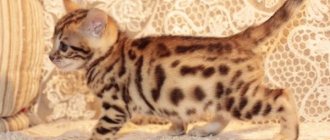What to prepare for the kitten's arrival
If the choice of the future pet has already been made, all that remains is to wait until it grows a little and can leave the nursery. It is necessary to prepare and foresee a lot for his arrival.
First of all, buy:
- carrying;
- a house or bed for sleeping;
- scratching post;
- bowls and food containers;
- dry and wet food;
- litter tray;
- filler;
- toys;
- accessories and grooming products.
Carrying
Carrying is necessary for safe transportation. They will not allow you to pick up an animal from a professional nursery in her absence. Moreover, this item will come in handy more than once in the future - when traveling to the veterinarian, to the country, or on vacation to another city or country.
Pet stores now offer a large selection of carriers of different sizes and from a variety of materials - rag, in the form of bags made of leatherette and plastic.
The latter option is preferable, as it has a large internal volume, rigid and durable walls, and retains its shape. If in the future it is possible to fly with your pet on an airplane, then you need to choose exactly this model, since airlines have special requirements for the luggage container.
It’s better to immediately choose a fairly expensive carrier, with a metal door and strong fastenings. You should not buy a small one, the baby will grow within a year, and adult British cats can reach a weight of six kilograms. Estimated price - 2-3 thousand rubles.
At first, with the door removed, the plastic carrier can also serve as a place to sleep.
Cat house and scratching post
In specialized stores, you can choose an option that will suit everyone - it will suit your pet in size and fit well into the interior of the house. There are many options for cat houses.
The most convenient one for a Briton is a small one on a round stand, which also serves as a scratching post. This breed is not very active and large play structures will not attract the kitten's attention.
The preferred upholstery option for the house is carpet; it washes best and lasts longer. The rope on the scratching post should preferably be jute. Although at first there will be a little garbage from it, any cats give it preference over other options and willingly sharpen their claws.
This design can be purchased for 4 thousand rubles.
You can get by with a bed, but this is a less convenient option. It wears out faster and requires frequent washing. The minimum cost is 1000 rubles. And in this case you will have to buy a scratching post separately. A small corner corner made of carpet will also not cost less than a thousand. But it quickly breaks down, and kittens are not too fond of such material.
Bowls and food containers
Among the huge variety of cat dishes, you should choose one that is comfortable for your pet and made from safe materials. This is stainless metal and earthenware.
A double bowl on an adjustable stand for water and dry food is very practical. You can buy a separate earthenware plate for wet and natural food. All three will cost 1-1.5 thousand rubles if chosen correctly.
The height-adjustable stand is very convenient - for a kitten you can lower the bowls to the lowest level, for an adult cat you can raise them. This accessory is pet-friendly and stable - it won't slide on the floor when the animal is eating.
A small container for food is also desirable; you can pour dry mixture (0.5-1 kg) into it and always keep it in the kitchen. It is usually made of metal and beautifully designed. This accessory is inexpensive - from 200 rubles.
Stern
First of all, you need to ask the breeder what kind of diet the British baby had in the nursery. For the first time, it is necessary to purchase exactly the food that the kitten is accustomed to.
If the desire arises, you can gradually transfer it to another, but not in the first days after the move.
Several bags of high-quality wet food are also necessary, even if you do not feed them to the animal in the future. In the first days at home, the baby will experience stress and may refuse to eat. This delicacy usually creates an appetite.
The cost of super premium food starts from about 500 rubles per 1 kg.
Toilet and litter
The acquisition of these important items must be taken seriously. First of all, find out from the breeder what kind of toilet and litter the British kitten uses in the nursery.
Experienced breeders never set up a separate small tray for babies; kittens, looking at their mother, begin to go to the same toilet as her.
Usually in nurseries they use closed toilets of the “house” type. They often consist of two compartments, one of which contains a grid for cleaning the paws. Such a toilet is not cheap and can cost about 5 thousand rubles, but it is made of high-quality plastic that is easy to clean, will never break and has bactericidal properties (with silver ion deposition).
They are usually equipped with special filters for air purification.
For small kittens, wood filler is preferable; most likely, this is what the baby is used to in the nursery. This is the most inexpensive and safest option. A 15 liter bag costs about 500 rubles.
Don't forget about a special scoop for cleaning the toilet.
Toys
Simply necessary in the house - balls, swings, mice made of natural fur, interactive ones. It is important that they are made of safe materials and do not have small parts that come loose. 1000 rubles are enough to purchase them. The missing ones can be easily made with your own hands from old clothes or a cardboard box.
Accessories and grooming products
A whole list of items is needed here:
- metal combs of two types - with a frequent and rare comb;
- massage brush for combing;
- nail clipper;
- lotions for the care of ears and eyes;
- shampoo for kittens;
- first aid kit;
- sprays for toilet training (you may need them at first).
These acquisitions will cost 2000-3000 rubles.
Table: British kitten hygiene
Care point What you will need How to proceed Frequency Cleaning the peephole
eye cleansing lotion or warm tea infusion; a piece of natural fabric.
You need to clean the eyes carefully, without pressing. They are wiped from the inner corner to the outer two times: first with lotion or tea infusion, then with a cloth moistened with clean water. Daily ear cleaning
ear lotion; ear drops; cotton pad.
First method: Take a cotton pad and moisten it with lotion. Carefully place the disc deeper into the ear, holding the kitten's head, and begin to gently massage. Remove the disc from your ear and take another one soaked in lotion. Roll it into a tight tube and place it in your ear
Twist it a little so that it picks up more dirt. This step can be repeated twice for better cleaning. Then use a disc soaked in lotion to wipe your pet’s ear. Second method: drop 2-3 drops into the ear for cleaning. Massage its base for 1-2 minutes. Using a cotton swab soaked in lotion, wipe the kitten's ear, removing dirt and wax.
Once a week Brushing teeth
toothpaste for cats; a special toothbrush or a piece of natural fabric for bleeding gums.
Apply a little toothpaste to a toothbrush or piece of cloth. Open the kitten's mouth and brush its teeth thoroughly, but without force. You can give him a little chew on the brush or cloth for better cleaning.
Every 2-3 days Bathing Shampoo for kittens
Pre-protect your kitten's ears from getting wet. You can place pieces of cotton wool in them. Place your baby in a bowl of water. The level is chest-deep. Temperature: 39–40 °C. Wet his fur well, apply a little shampoo and lather well. Rinse the area under the tail and tummy especially thoroughly. Simply wipe the muzzle with a damp cloth. Rinse off the shampoo and wrap the kitten in a warm, soft towel. The next day there should be no cold or drafts in the apartment. Between main bath procedures, you can use dry shampoo (powder or spray) once every 7 days to keep the coat clean.
If the fur becomes dull, starts to smell or becomes greasy, it’s time to wash the kitten. On average - once every 3-4 months. Combing
slicker; small furminator; rubber brush; fine comb; combined massage brush; restoring and caring spray for wool. It will help avoid tangles and tangles, making the coat obedient, soft and shiny.
Smooth out the fur with a comb. If there are tangles, gently untangle them with your fingers. If a kitten sheds, its fur should be combed with a furminator once a week. On other days and when not shedding, brush with a slicker brush. Then go over the fur with a rubber brush, removing any remaining dead hair. Smooth out the fur with a comb again. Finish combing with a massage brush: first comb the fur with the metal side, then with the bristles. Spray the fur with restorative spray and comb the kitten again with a comb.
During molting - once every 1-2 days, at normal times - once every 3-4 days. Nail trimming Claw cutter
choose a well-lit place; in case of a cut, prepare a bottle of hydrogen peroxide; Before cutting your kitten's claws, caress and calm him down. Take it in your arms; Press the pad with two fingers so that the claw is accessible and examine it. Usually, in good lighting, you can easily see the regrown edge of the claw and the living part - the pink tissue inside the claw. It has blood vessels and nerve endings, so there is no need to injure it; at a distance of 1–2 millimeters from the pink tissue, cut the claw slightly at an angle, respecting its natural shape, and file if necessary; Don't forget to trim the claw on the cat's fifth toe as well. It is this that most often grows into the pad and causes pain to the kitten.
As the claw grows
How to keep your kitten safe
British babies are just as restless and inquisitive as kittens of more active breeds, such as the Bengal or Abyssinian. As soon as they get comfortable in their new home, they will definitely crawl into every corner and explore all the cabinets and tables.
It is the responsibility of the owner and all household members to ensure the safety of pets. Little Britons need care and attention just like ordinary children.
To protect the British from danger and prevent irreparable consequences, the following measures must be taken:
- Do not let the kitten alone in the toilet room, especially when the water is filling the bath. The toilet lid must always be closed. Although a cat can swim, a kitten can easily drown; he simply cannot get out of the water.
- All medications and household chemicals must be placed in closed cabinets. One of the most frequent calls to veterinary clinics today is poisoning of kittens under one year of age.
- All windows that are usually opened for ventilation should have special screens. If a small British kitten falls even from the second floor, he could die or be seriously injured. By the time the baby grows up, anti-cat nets should be on all windows in the apartment, if it is a multi-story building.
- While the baby is small, you should not leave him alone for a long time, unattended. If he climbs onto a tall cabinet, he may also break. It is also better to hide small objects and toys. It is better, when leaving, to lock it in a room where there are no dangerous objects.
- In a private house, you must ensure that the doors to the garage, boiler room, and utility rooms are always closed. Poisoning, for example, with antifreeze, often costs a child’s life.
- The garbage container in the kitchen should be closed or kept out of reach of the pet. The kitten can be poisoned by the remains of low-quality or unsuitable food or be injured by sharp objects, such as metal cans.
- Rodent traps and cockroach baits are strictly prohibited in the premises where a British kitten lives.
Ideal age to move
Many future owners want to monitor the growth and development of a British baby from an early period, at least from four weeks. But it is absolutely forbidden to take such a pet away from its mother.
The ideal age to move is three and sometimes four months.
By 12 weeks, a British kitten is more or less ready for independent living. It is at this age that the baby stops sucking mother’s milk, learns to eat solid food, and his own immunity begins to develop.
It is the mother who must do the weaning. If this procedure is carried out forcibly, then, in addition to health problems, behavioral disorders will certainly arise. Early weaning is also fraught with the development of diseases of the respiratory system, diarrhea and, as a result, dehydration.
Both vaccinations against panleukopenia, calcivirus and rhinotracheitis have already been carried out, which means the baby has immunity to these diseases.
The kitten is physically strong enough to move. At two or three months he received from his mother the skills of using a litter tray.
When parting with its mother early, the emotional state of a British kitten suffers greatly, since it is she who teaches how to communicate with people and other animals. A three- to four-month-old baby perceives new faces not with fear, but with curiosity. Therefore, it is worth listening to the opinion of the breeder and picking up a British kitten from the nursery at 12, and sometimes at 16 weeks.
How to feed
Proper feeding is based on three basic principles: regimen, correct selection of diet and separate nutrition.
It is very important to train the animal to receive food at the same time. This way his digestive system will work more stable, and your relationship will only become stronger from the nutrition ritual. Choose only high-quality products for your pet
If this is a ready-made food, then you should carefully study the label before succumbing to tempting advertising. In addition, do not forget that cats are big conservatives. Try to feed the animal the same food and products, making changes to the diet very gradually if necessary. Choose one of the options for your pet: dry food or natural food. Veterinarians do not recommend mixing them due to different digestion rates. If you still want to give your animal natural products from time to time, then remove the dry food an hour and a half before feeding. Always following this principle, you can make a combined diet on an ongoing basis.
For very small kittens under the age of 4 months, a special (four meals a day) food intake schedule should be provided. Each meal should include one of the following ingredients: low-fat cottage cheese, boiled chicken or ready-made canned children's meat, dry food, well-chopped raw beef. Don't forget that fresh water should always be available.
The combined diet of older individuals usually includes two types of lean meat (beef and chicken), cottage cheese and dry food.
This is a basic feeding option that may vary depending on your pet's taste preferences and health status. But there are some general taboos that all cat owners should know:
- Do not give your pets dog food, as its composition does not meet the needs of the cat’s body;
- You should not feed your cat fish, as this negatively affects the condition of the urinary tract;
- products containing bones may be hazardous to the health of the animal;
- there is no need to give your cat milk, as this will not bring any benefit to her body, but can lead to digestive upset;
- Do not accustom your cat to eating from your table, so as not to provoke obesity and other health problems.
When mixed or natural feeding, do not forget about the benefits of vitamins. Like people, animals periodically need to take multivitamin complexes to strengthen the immune system, improve the appearance of their fur coat and improve the overall health of the body.
Moving and adaptation of a British kitten
The first days in a new home are the biggest stress for a baby. Correct behavior by the owner will help the kitten quickly get used to it and survive this difficult period, which takes from three days to two weeks.
It is better to organize your pet's move on the eve of the weekend or vacation in order to give him maximum attention.
First of all, for quick adaptation it is necessary to limit the space. This means that without a person, the kitten should only be in a small room.
It is advisable that there are no unnecessary objects or secluded places where you can hide. The carrier in which he arrived, the house or bedding, the toilet and bowls of food and water should be close to each other. Once the pet gets comfortable, the tray can be moved to its designated place and the doors to other rooms can be opened.
If you immediately let the kitten walk around all the rooms, it may get confused, not find the toilet, and hide in a dark corner out of fear.
Surrounded by objects that he immediately recognizes as his property, the baby quickly recognizes himself in a new home.
You should not force your little Briton into your arms. Even if he begins to purr, but his body is tense, this is a manifestation of fear, not pleasure. Soon he will get comfortable and ask for affection himself.
But the baby must eat regularly. If he is on a natural diet, then 4-6 times a day. With a diet consisting of dry high-quality food, 3-4 feedings are sufficient. Constant access to clean water is required.
It is important to talk kindly to the kitten, not to raise your voice or get angry with him, even if he broke something or went to the toilet in the wrong place. The baby is very sensitive to any emotions.
If there is another animal in the house, then you need to introduce the pets very carefully. It is better to wipe a piece of suede first on the old-timer and then on the baby, then the latter will be safe - the adult cat will not touch him.
What vaccinations do British kittens need?
What vaccinations do British kittens need and at what age should vaccination start?
The first vaccination is given to a kitten that has reached the age of 3 months. If for some reason this was not possible, you should wait until the baby teeth change and get vaccinated then (about 8 months). Before the first vaccination, the kitten must undergo anthelmintic treatment.
The second vaccination is done three weeks after the first. For two weeks after the second procedure, the cat must stay at home so that the immune system strengthens and antibodies to some common diseases appear.
Some cat owners believe that a pet that is constantly at home and does not go outside does not need vaccination. This is wrong. Vaccinations should be given to all pets, regardless of their lifestyle.
Bacteria that cause serious illness can enter the home on shoes, bags, packages, and clothing. A cat can get sick at home, especially since the immunity of indoor pets is weaker than that of street pets. Therefore, vaccination is mandatory for everyone.
Proper education of a British kitten
Raising a British child cannot be put off until later. It must be started immediately, from the first minutes in the house, acted kindly and persistently. In no case should shouting or physical punishment be used against an animal.
Subordination and respect for the owner
First of all, the pet must understand that the most important leader in the house is the owner and he must obey him unquestioningly. Usually, if a person does not scream, but strictly and firmly reprimands for a mistake, and affectionately rewards with a treat or toy for correct actions (for example, using a scratching post), then the baby quickly recognizes the owner’s leadership.
It is important to become an indisputable authority for the British from the first days, then there will be no problems in the future mutual existence.
Toilet tray
Usually the toilet issue is the biggest concern of the future owner. But, if you follow all the breeder’s recommendations, then no problems will arise.
Choosing the right tray, limiting the pet's movement around the house in the first two days and the owner's persistence will help solve this problem.
If the baby does not go to the toilet for a long time, then you should drop him off there 10-15 minutes after eating.
Filler taken from the mother's tray helps a lot. A familiar smell will quickly evoke the necessary associations. In the future, it is advisable to leave a little used filler and mix it with clean filler.
If the little Brit gets lost in the first days and forgets where his toilet is, then you can place several trays around the house.
If embarrassment does occur, do not scold the baby. This is not a whim or harmfulness, but the result of stress and fear. The mark must be washed immediately with special products. The disinfectant composition for veterinary use Verocid has proven itself well - it removes any odors. Sometimes toilet training sprays and products like Antigadin help.
At first, you shouldn’t let your kitten uncontrollably onto beds or sofas. If it marks your upholstered furniture, it will be much more difficult to remove the smell. When the period of stress passes, the toilet problem will disappear on its own.
scratching post
A three to four month old British kitten adopted from a nursery will most likely know how to use a scratching post. Even if the excitement of moving made him forget his old skills, they will quickly be restored if the owner behaves correctly.
If space is limited in the first days, the scratching post should be placed next to the house. If there is nothing else suitable for sharpening his claws, the baby will quickly recall his mother’s lessons in his memory.
If your kitten keeps you up at night
If a small kitten squeaks at night or early in the morning and wakes you up. Firstly, if you adopted the kitten on time and not too young, he will no longer miss his mother so much and will not wake you up at night.
If he still wakes you up, you can tell him “no.” Pet him if he is small and bored. It's like a little child, he needs your love and affection, because now you are his mom or dad. Who else can he trust if not you?
It could also be that he is locked in a room with no access to a toilet. Or he just wants to eat, but there is no cup of food nearby. My cat sleeps in the same room where he has a toilet and where he has a cup of food. Therefore, there is no need for him to wake us up at night if he wants to go to the toilet or is hungry.
By the way, I noticed that many cats usually go to the toilet either late in the evening or early in the morning. But maybe it's just my cats that do this?
Of course, the kitten may simply become bored; he has already slept! He wants to play and calls mom or dad - play with me! Usually I manage to explain to him that I wouldn’t mind sleeping, and he goes to play with his toys himself.
Therefore, you need to give him different toys so that he can occupy himself while you sleep. In general, there should be enough toys so that the cat (especially a small kitten) does not get bored while you are at work. Kittens play constantly, with everything that comes under their paw. So, to prevent your new cell phone or collectible watch from falling under his paw, give him something that he can throw, drop and bite. It will be better for you.
You can also play with the cat before bed to make it tired, and then give it a piece of raw meat. This will extinguish the hunter's instinct, because all cats are hunters! And precisely at night. And since she already seemed to have hunted, she can sleep peacefully.
In general, if you love your cat or cat and strive to understand them, you will not have any problems with raising them. Especially with the Scots, since they are already very smart and kind, initially. You can achieve mutual understanding with your pet only with kindness, care and love. In return, you will receive the same care and love from your pet. With cats it is very simple, if you care for it and love it, then it will always love you back.
Cats do not know how to take revenge, take offense, they do not know how to betray, or do something out of spite. All deviations from normal cat behavior are ALWAYS the responsibility of the owner. It was the owner who did something wrong. We need to find out what it is and fix it. And the cat’s behavior will improve.
Cats, unlike dogs, are not initially herd animals. Therefore, if a cat follows you around, purrs on your lap and hugs you by the neck, it means that she really LOVES you, and this is not a herd instinct.
Features of caring for the appearance and health of a British kitten
Caring for the little Briton's coat is very important. The baby's fur seems plush due to the thick and voluminous undercoat. Under no circumstances should it be pulled out. Therefore, a massage brush cannot have metal teeth; it is permissible to use only a rubber one.
Up to six months you can do without triple combing, use only a rubber brush; it will remove excess outer hair from the baby, and the undercoat will not be harmed. It is advisable to carry out the procedure once a week. The pet really likes this accessory - the massage has a beneficial effect on the skin and soothes it. In addition, in this case the wool is not electrified.
An adult British cat, especially during the molting period, is combed first with a sparse comb, then with a frequent comb and a brush. A slicker will only be needed if tangles form. Finally, be sure to remove any remaining hair with wet hands, otherwise it will end up in the kitten’s stomach.
Your pet's nails should be trimmed as they grow, but at least once a month. On the hind legs they often wear out, especially if the floor is made of porcelain stoneware or marble chips. On the front ones, the very tip of the claw is cut off with a nail clipper - no more than one millimeter and always at a right angle.
There is no need to bathe your Briton. A healthy animal takes care of the cleanliness of its fur.
If there is an urgent need for washing (after a walk, diarrhea, severe pollution), then you can only use special shampoos.
The cleanliness of your baby's eyes and ears should be checked daily, as this breed has a tendency to watery eyes and accumulate dark discharge in the corners of the eyes. If they become dirty, clean them carefully using special solutions and drops.
The British are mostly healthy animals. The biggest problem is obesity. Kittens are playful and restless, but adult cats become imposing, leisurely, usually move little and sleep a lot. It is important to choose the right diet from a young age and avoid overeating.
Hypertrophic cardiomyopathy is a rarely inherited genetic disease and is observed in adult males. At risk are kittens that are slowly gaining weight. In this case, it is recommended to periodically visit the veterinarian and have an ultrasound examination of the heart. Urolithiasis is also quite common, especially after castration.
Where to start raising a child?
An animal must know its place. For an apartment cat, this concept includes such aspects as:
- the ability to relieve need in a tray intended for this purpose (and only there);
- willingness to respond to one's own name;
- no habit of begging or stealing food.
The listed skills should begin to be instilled in the baby as soon as he is taken to a new home. At 3 months (and it is at this age that kittens are best separated from their mother) the animal is quite capable of mastering the simplest rules of behavior. The main thing is to know how to explain your requirements to your pet.
Tray training
The kitten learns the habit of urinating and defecating in a designated place from its mother, so you need to check with the breeder how the toilet was organized in the baby’s home. Using the same tray and filler, you can greatly simplify your pet’s adaptation to new conditions.
Perhaps the baby, who has been fussing around in search of the toilet several times, will have to be taken there, but after a couple of days he will learn to find the tray himself. The main thing is to keep the cat litter clean (no cat wants to go into a dirty one).
The tray is clean, but the animal still leaves piles and puddles everywhere? It is worth looking for another place for the toilet. You can move the tray to a corner that your cat especially likes and, just to be sure, put a piece of paper in it, blotting one of the puddles your pet previously made with it. The smell of your own urine will help the kitten orientate itself.
You should praise the animal when it relieves itself where it is supposed to, but you should not scold it for peeing in other places. Moreover, you should not “raise” your pet by poking the baby’s nose into his own excrement. This tactic will give the cat the impression that he is being punished for the act of defecation itself. Should we then be surprised to find piles in very hidden places, for example behind cabinets and under sofas?
You will have to be patient, and instead of punishments, use special sprays (“Antigadin”, “Mr. Frech”, “Shitting? No!”, “STOP the problem. Doesn’t shit, doesn’t mark”, etc.). The smell of such products will make the cat feel uncomfortable. The spray is applied to surfaces that arouse the pet's interest until he gives up the intention to defecate on them. A similar effect can be achieved by rubbing freshly washed surfaces with citrus zest, whose aroma is also unpleasant for pets.
Getting to know the nickname
Calmness and patience will help teach the kitten any necessary skills, for example, the ability to respond to the nickname chosen for it. When performing any actions with a kitten, be it playing, feeding or other types of care, you need to repeat its name over and over again in a gentle voice so that it is imprinted in the baby’s mind and is remembered by him as an invitation to something pleasant.
To achieve success faster, you need to choose a nickname for your pet that will be easy for him to understand. It is better to give preference to a short name (no more than two syllables), and let it contain more hissing and whistling sounds that are attractive to cats: Ksyusha, Vaska, Roxy, etc.
Getting used to the "canteen"
From the very first days, you should accustom the kitten to feeding by the hour and strictly in the designated place. This will help you avoid begging and stealing food in the future. Having prepared a balanced diet for the pet in advance, strictly following the developed plan and showing inflexibility and strength of character in this matter, the owner will not leave the baby a chance to grow up to be a manipulator and picky.
Sexual development of the British kitten
The period of sexual development begins at six months for the British. But, if cats mature and grow for a long time, usually up to two years, then the situation with females is different.
At seven to nine months the first estrus may begin, and by ten to twelve months the cat is ready to bear and give birth to offspring.
The duration of estrus is from seven to ten days. If fertilization does not occur, then after two to three weeks it will begin again. The female becomes irritable, excited, sometimes even aggressive, screams loudly, some individuals mark their territory like cats.
If the British female is not intended for breeding, then after one or two heats it is necessary to sterilize. You can limit yourself to taking sedatives, but if they are plant-based, they are usually ineffective.
Hormonal drugs reduce sexual activity, but they can destroy a cat’s genitourinary health within six months of regular use.
“Empty” heats not only cause anxiety for the whole family, but also cause the development of endometriosis and pyometra in the female.
Annual calendar for caring for a British kitten
For the convenience of owners, all mandatory procedures for caring for the appearance and health of a British kitten are summarized in a table.
| Periodicity | Type of procedure |
| Daily | Combing during shedding season |
| Preventative examination of external condition | |
| Weekly | Cleaning ears and eyes |
| Regular brushing | |
| Monthly | Nail trimming |
| Quarterly | Deworming |
| Grooming (if desired) | |
| 2 times per year | Preventive examination by a veterinarian, urine test for urolithiasis |
| 1 time per year | Preventive vaccination against panleukopenia, rhinotracheitis, calcivirus and rabies |
| Vaccination against lichen |











